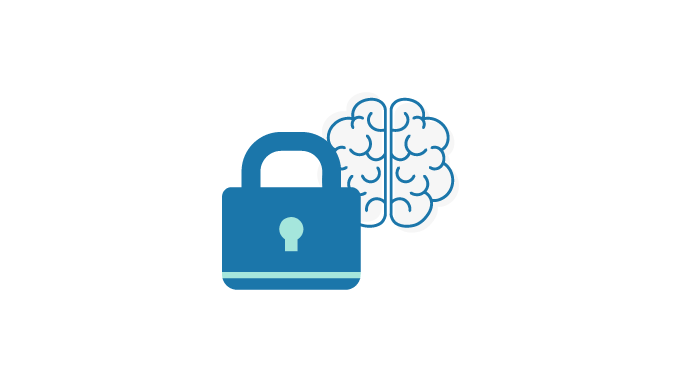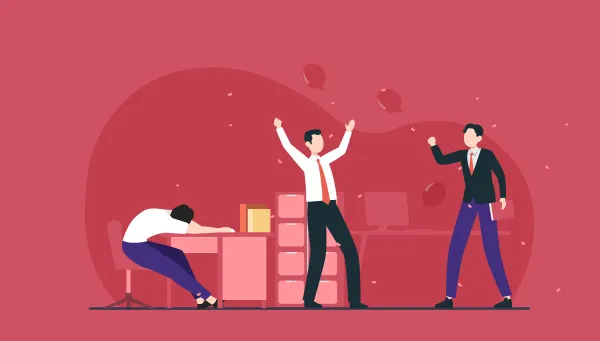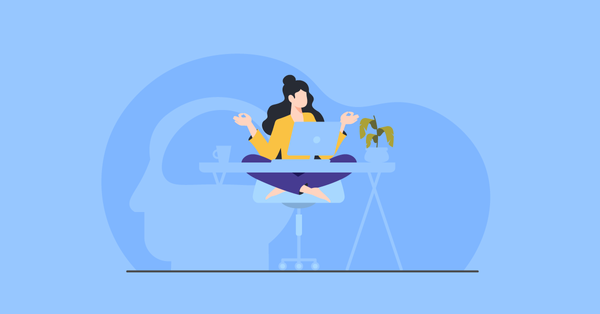5 Ways to Overcome a Mental Block at Work
Have you ever watched an employee stare blankly at their computer screen, seemingly frozen in thought? Mental blocks can be a productivity killer, hindering progress and frustrating both employees and managers.
But don't worry; you're not alone.
According to a Miro report, almost 60% of workers experience mental blocks weekly or daily. These cognitive roadblocks can range from creative slumps to simple forgetfulness and significantly impact productivity.
Understanding the causes of mental blocks is essential for organizations to provide adequate support. But before we discuss strategies for overcoming mental blocks, let's examine why they occur and what their symptoms are.
Understanding Mental Blocks

A mental block is a psychological barrier preventing you from progressing with a task or project. Although mental blocks are often called different terms, such as writer's block, brain fog, or even mental fatigue, they all feature the same conundrum: They are the inability to concentrate, think, or reason clearly, resulting in a lack of drive.
It can manifest in various ways, such as:
-
Procrastination: Putting off tasks due to fear, doubt, or overwhelm.
-
Lack of Motivation>: Feeling uninspired or uninterested in your work.
-
Imposter Syndrome: Doubting your abilities and feeling like a fraud.
-
Perfectionism: Setting unrealistic standards that lead to frustration and anxiety.
Remember, mental block is not the same as mental exhaustion. It can be one factor, but not the main reason. You are usually unable to access your natural creative skills and abilities. Everyone is susceptible to it, and it can happen at any time.
Forbes reports that unchecked mental fatigue can even impact your physical health. If you don't learn to overcome a mental block, it can derail your productivity and sense of contentment with life.
What Causes Mental Blocks at Work?
Mental blocks (often misunderstood as brain fog) among employees, can significantly impact employee productivity, job satisfaction, and overall organizational performance.
No matter what you call them, all mental blocks are caused by the same factors. Some are more common than others, but they are believed to be the reasons behind limiting employees' ability to perform or focus.
Understanding the causes and symptoms of mental blocks is crucial for employers to provide effective support and create a thriving workplace.
Again, according to Harvard Health Letter, the causes of mental blocks or the inability to think clearly are -
-
Lack of sleep
-
Vitamin B12 Deficiency
-
Prescription and over-the-counter medication
Suggested Read: How Sleep Deprivation Affects Work Performance
Again, there are more causes or factors leading to mental blocks than those listed above -
1. Mental Exhaustion

Feeling overwhelmed by a large workload or complex tasks can often lead to mental blocks. When your employees feel overwhelmed with thoughts or too many tasks, it can cause mental exhaustion, eventually resulting in mental blocks.
In addition, mental exhaustion can result in overstimulated brain cells. This can impair your employees' cognitive abilities, such as their thought process, decision-making abilities, creativity, and others, reducing their productivity.
2. Procrastination
Procrastination, delaying important tasks, can significantly impact employee productivity and job satisfaction. It can increase stress, missed deadlines, and a damaged reputation.
Procrastination can damage an employee's reputation and hinder career advancement.
Organizations should create a supportive environment to combat procrastination, set clear expectations, provide time management training, and prioritize employee wellbeing. By addressing this common workplace challenge, companies can foster a more productive and positive work culture.
3. Burnout

Work fatigue and stress commonly contribute to burnout, negatively impacting employee wellbeing and productivity. A lack of a healthy work-life balance, overwhelming workloads, or decision fatigue can lead to mental blocks and burnout.
Burnout can also lead to decreased productivity, increased absenteeism, lower job satisfaction, and higher turnover rates.
Suggested Read: How to Recover from Burnout: 11 Strategies To Reclaim Your Well-being
4. Cluttered Workspace
A cluttered workspace can significantly impact employee productivity and wellbeing. Studies have shown that a disorganized environment can increase stress, anxiety, and even cortisol levels.
When surrounded by chaos and disorganization, employees may struggle to concentrate, focus, and prioritize tasks. Further, a cluttered desk can lead to decision fatigue, as the brain is constantly bombarded with visual information.
5. Self-doubt/imposter syndrome

Imposter syndrome, the fear of being exposed as a fraud, is a common cause of mental blocks in the workplace. This internal struggle can significantly impact employee confidence, productivity, and wellbeing.
It can decrease productivity since employees battling imposter syndrome may hesitate to take on new challenges or express their opinions. Again, the constant fear of being exposed can contribute to stress and anxiety.
Suggested Read: 7 Ways You Can Help Employees Dealing With Work Anxiety
6. Lack of Sleep
Sleep deprivation can significantly impair cognitive function and contribute to mental blocks. When employees are sleep-deprived or overworked, they are more likely to experience:
-
Decreased concentration: Difficulty focusing on tasks and retaining information.
-
Increased irritability: Mood swings and difficulty managing emotions.
To combat mental fog, encourage employees to prioritize adequate sleep and take regular breaks throughout the day.
Suggested Read: How Sleep Deprivation Affects Work Performance
How to Identify If an Employee Is Suffering from Mental Blocks?

Mental blocks often stem from underlying issues such as sleep deprivation and workplace stress. According to the CDC, one-third of Americans don't get enough sleep, while nearly 83% experience workplace stress. These factors can contribute to mental exhaustion and burnout, making employees more susceptible to mental blocks.
Here are a few signs that an employee might be experiencing one right now:
-
Lack of creativity or inability to come up with new ideas
-
Persistent self-doubt or negative thought patterns
-
Difficulty focusing on tasks or getting motivated to start them
-
A noticeable drop off in productivity and performance
-
Struggling to make decisions through mental fog
-
Avoiding responsibilities and procrastinating work
-
Feeling overwhelmed or frequently operating at a high stress level.
A study and insights from the U.S Bureau of Labor Statistics estimate that just one hour of lost productivity per week costs an enterprise with 1,000 employees over $2.2 million.
Can Employers Help Overcome Mental Block?

Employers play a crucial role in supporting their employees and teams through mental blocks. Leaders must shift their focus from supervisors to coaches, providing guidance and support when employees face challenges.
By recognizing the signs of mental blocks, managers can intervene effectively. This may involve:
-
One-on-One Discussions: Engaging in open conversations to understand the root causes of mental blocks.
-
Providing Resources: Offering tools and strategies for managing stress and improving focus.
-
Adjusting Workloads: Modifying tasks or deadlines to alleviate pressure and prevent burnout.
By taking a proactive approach, managers can help employees overcome mental blocks and create a more resilient and productive workforce.
About 63% of workers experience mental blocks when working alone, compared with less than 40% when collaborating with others. Leaders can promote collaboration in a variety of ways: verbally promoting it and rewarding it, setting aside time for team huddles, and using tech tools that facilitate real-time group work.
5 Winning Strategies to Help Employees Overcome Mental Blocks

Mental blocks often arise from two primary factors: insufficient information and overwhelming workloads. Addressing these causes is crucial for creating a thriving and healthy work environment.
By addressing these underlying causes, employers can help employees overcome mental blocks and unlock their full potential.
1. Identifying and Addressing Mental Blocks
Mental blocks can significantly impact employee productivity and job satisfaction. Understanding the root causes of mental blocks is essential for managers to provide effective support and create a thriving workplace.
The first step is to identify the underlying Issue. Look for changes in productivity, communication, or overall demeanor. Try to encourage employees to share their challenges and concerns. Further, you can also implement surveys or feedback mechanisms to gather insights.
The step is to reevaluate priorities, i.e., assess your team's workload. Ensure employees have manageable workloads and deadlines. Help them prioritize tasks based on importance and urgency. Communicate clear goals and expectations to reduce confusion and stress.
When you complete or accomplish goals, your brain releases dopamine which further helps to improve your mental health and mood. Starting small and accomplishing small tasks can affect your overall mental health in a good way.
2. Break Down Projects into Smaller Tasks

One of the most effective strategies for overcoming mental blocks is to break down large projects into smaller, more manageable tasks. This approach can simplify complex tasks, making them less daunting and increasing motivation.
Employees can minimize the workload and stress associated with tackling the big picture by focusing on important tasks one at a time. Completing smaller tasks can also provide a sense of accomplishment and momentum, boosting morale and motivation.
Leaders can play a crucial role in helping employees break down projects into smaller, achievable steps. By providing guidance and support, managers can ensure that employees are equipped to tackle each segment of the project successfully.
Begin with a Vantage Fit Demo! Schedule one now! And, Start Your Corporate Wellness Journey Today
3. Declutter Your Workspace
"A cluttered physical space can lead to a cluttered mental space. - unknown"
A cluttered workspace can significantly impact employee productivity and mental clarity. When your work environment is cluttered or uninspiring, overcoming mental blocks becomes challenging. By creating a clean and organized environment, managers can help their teams:
-
Reduce Distractions: A tidy workspace minimizes visual distractions, allowing employees to focus on tasks.
-
Improve Focus: A decluttered environment can enhance concentration and reduce mental fatigue.
-
Reduce Stress: A clean and organized space can create a calmer and more relaxed atmosphere.
Encourage employees to declutter their workspaces regularly and provide resources to help them create a productive and inspiring environment. A tidy workspace can contribute to a calmer and more relaxed atmosphere, reducing the likelihood of mental blocks and improving productivity.
4. Encourage Mental Breaks To Reset The Mind.

Just like any finely tuned machine, our minds and bodies need regular maintenance to function optimally. In the fast-paced world of work, taking short breaks throughout the day is essential for preventing burnout and maintaining peak performance.
A sedentary work style can exacerbate mental blocks and negatively impact employee wellbeing. Sitting for extended periods without breaks can decrease focus, frustration, and physical discomfort. This, in turn, can hinder productivity and increase the likelihood of errors.
Here are a few steps you can follow to encourage breaks:
-
Create a workplace culture that supports taking short breaks throughout the day.
-
Whether it's a quick walk, a brief meditation session, or simply stepping away from your desk, these breaks provide a much-needed mental reset.
-
Consider offering flexible work options to allow for movement and activity breaks.
-
Implement employee wellness programs that promote healthy habits and encourage physical activity.
Here are some benefits of taking breaks:
-
Breaks can help employees return to their tasks with renewed energy and concentration.
-
Taking time to rest and relax can alleviate stress and anxiety.
-
Breaks can spark new ideas and foster a creative mindset.
5. Prioritize Mental Health and Self-care
It is important to remember that mental health is as important as physical health. If you put mental health in the back seat, then it'll affect your overall wellbeing. Just like physical health, mental health needs strength to rest and revitalize.
It is a critical component of employee wellbeing, directly impacting productivity, job satisfaction, and overall organizational success. By prioritizing mental health and providing necessary support, organizations can create a more positive and productive work environment.
Here are a few ways you support employee Mental Health:
-
Foster a culture of open communication, empathy, and understanding. Encourage employees to share their concerns and seek support without fear of judgment.
-
Provide access to mental health programs, counseling services, and employee assistance programs.
-
Implement flexible work options to accommodate employees' needs and reduce stress.
-
Promote healthy habits such as exercise, nutrition, and sufficient sleep (7-9 hours).
-
Encourage employees to take breaks, practice mindfulness, and engage in activities that help them relax and recharge.
Demonstrate your commitment to mental health by prioritizing your own wellbeing. When leaders care for themselves, it sends a powerful message to employees.
Suggested Read: 10 Employee Mental Health Benefits: Invest in Your Workforce
Overcome Mental Barriers In The Workplace With Vantage Fit

Vantage Fit understands the challenges organizations face in breaking down mental blocks. From physical and mental well-being to financial health and personal fulfillment, our holistic approach to workplace wellbeing supports employees in all aspects of their lives.
Discover how a tailored wellness program can help your team overcome mental blocks and thrive. Contact us today to learn more and schedule a demo.
Enhance workplace mental health with Vantage Fit. For additional support and resources, consider partnering with Vantage Fit, a leading provider of employee wellness solutions.
FAQs
1. Can mental blocks lead to long-term issues if not addressed?
Yes, untreated mental blocks can lead to chronic stress, burnout, and decreased productivity.
2. Are certain employees more prone to experiencing mental blocks than others?
Individuals with high levels of stress, anxiety, or perfectionism may be more susceptible to mental blocks.
3. How can employees themselves take proactive steps to avoid mental blocks?
Employees can practice stress management techniques, prioritize self-care, and seek support when needed.
4. What are some early warning signs of a mental block that managers should look out for?
Managers should watch for decreased productivity, changes in behavior, and increased stress or anxiety.



